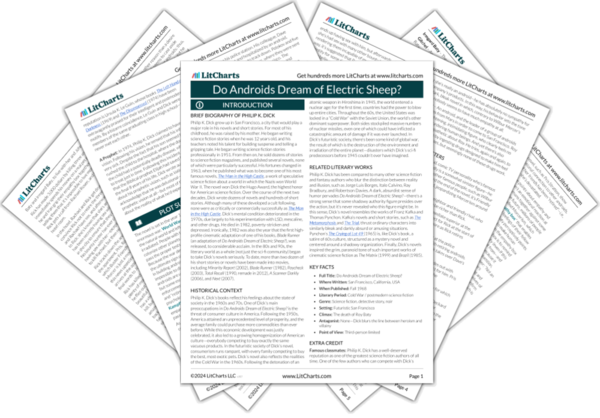Summary
Analysis
Rick thinks about Dave Holden’s sudden hospitalization—an android shot him with a laser. Bryant informs Rick that Dave was trying to retire a group of ten androids, six of which are here in California now. Bryant wants Rick to fly to Seattle, where he can interview some executives in the Rosen organization and ask them about their androids. Bryant makes it clear to Rick that he considers Rick vastly inferior to Dave—Dave was far more experienced with hunting down androids.
Rick has a lot to live up to—and in a cheaper kind of sci-fi novel, this would be Rick’s primary motivation (impressing Bryant, getting a better job, etc.), but Dick is more interested in other kinds of questions: What is real?; What is human?, etc.
Themes
Bryant and Rick discuss the Voigt-Kampff test. It’s true, Bryant admits, that a few real human beings can’t pass this test. Soviet psychologists, working with schizophrenic humans (a good example of the kind of person who can’t pass the test) have tried to develop an extra-precise version of the test, but with inconclusive results. As a result, Rick’s work in Seattle will be a challenge—he’ll have to use the test, but also his own gut instincts, to distinguish androids from humans. If he gets something wrong (i.e., kills a human instead of an android), the Rosen organization will keep it quiet.
Right away, Rick is forced to acknowledge that there are problems with the Voigt-Kampff test, and with the very idea of measuring whether or not someone is human. Humanity isn’t a binary: there are gray areas, and no single characteristic necessarily makes someone human. The absence of a clear test of what is and isn’t human symbolizes the moral ambiguity of this novel.
Themes
Rick flies out to Seattle in his hovercar, and lands on the roof of the Rosen Association Building. As he lands, he sees a young woman waiting for him. The woman introduces herself as Rachael Rosen. Rick notices her long eyelashes, which are probably artificial.
This is a subtle bit of foreshadowing. Rachael’s eyelashes are artificial, but so is the rest of her body (as we’ll learn later)—and so is almost everything in this society.
Themes
Rachael asks Rick about Rick’s career as a “bounty hunter”—someone who retires androids. Inside, Rachael shows Rick a raccoon named Bill, which the Rosen organization bought recently. Rick thinks about his need for an animal, and asks Rachael if she’d sell him a pet. Rachael explains that he could never afford one from the Rosen organization. Rachael introduces Rick to Eldon Rosen, her uncle, who runs the Rosen corporation. He’s a dapper, elderly man.
Rachael seems to be toying with Rick. She knows that Rick, like everyone else in San Francisco, is interested in buying animals—and thus, she dangles animals in front of Rick. But she also tells Rick that he can’t afford a raccoon or any other pet from Rosen. In this way, Rachael is basically bribing Rick to help the organization.
Themes
Get the entire Androids Dream LitChart as a printable PDF.

Rick follows the Rosens into their building, where he explains that he’ll be running a series of Voigt-Kampff tests on Rosen employees to root out potential androids. Rachael asks Rick to give her the test. Rick, puzzled, agrees. Eldon tells Rick that Rachael is Rick’s first subject—a potential android. It’s up to Rick to decide whether she’s human or not.
This is a clear challenge to the legitimacy of the Voigt-Kampff test. We’re not sure (at least not yet) if Rachael is human or not—and as the novel goes on, we’ll become less and less sure that any of the characters are human, or just what “human” means in the first place.
Themes












